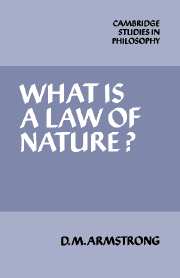Book contents
- Frontmatter
- Contents
- Acknowledgements
- PART I A critique of the Regularity theory
- 1 Introductory
- 2 Critique of the Regularity theory (1): The problem of accidental uniformities
- 3 Critique of the Regularity theory (2)
- 4 Critique of the Regularity theory (3)
- 5 Can the Regularity theory be sophisticated?
- PART II Laws of nature as relations between universals
- Conclusions
- Works cited
- Index
5 - Can the Regularity theory be sophisticated?
Published online by Cambridge University Press: 05 June 2012
- Frontmatter
- Contents
- Acknowledgements
- PART I A critique of the Regularity theory
- 1 Introductory
- 2 Critique of the Regularity theory (1): The problem of accidental uniformities
- 3 Critique of the Regularity theory (2)
- 4 Critique of the Regularity theory (3)
- 5 Can the Regularity theory be sophisticated?
- PART II Laws of nature as relations between universals
- Conclusions
- Works cited
- Index
Summary
PRELIMINARY
The strength of the case against the Naive Regularity theory of laws in particular, and the Regularity theory of laws in general, should now be evident. Some of the difficulties which have been rehearsed have been appreciated by Regularity theorists themselves. It is rather generally recognized that the class of Humean uniformities includes members which we do not wish to include among the laws of nature. A number of Regularity theorists have also recognized that it is not even easy to say what a uniformity is. The trouble here is provided by strange predicates such as ‘grue’ Suppose that all Fs are Gs, but that the predicates ‘F’ and ‘G’ pick out what we would naturally think of as a heterogeneous miscellany. Is this a Humean uniformity? Intuitively, no. But the unsupplemented Naive Regularity theory seems to lack the resources to eliminate such ‘uniformities’.
More recently, Regularity theorists have faced up to the difficulties posed for their view by the apparent existence in nature of irreducibly probabilistic laws. There is no simple emendation of the Naive theory available for dealing with such laws. For instance, it is no good substituting relative frequencies for uniformities, because certain relative frequencies are only the most probable, not the inevitable, manifestations of probabilistic laws. The only way to preserve a Regularity theory seems to be to introduce objective single-case chances or propensities, and then assert that probabilistic laws are uniformities linking more ordinary properties with these new sorts of property.
- Type
- Chapter
- Information
- What is a Law of Nature? , pp. 60 - 74Publisher: Cambridge University PressPrint publication year: 1983



